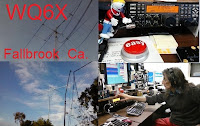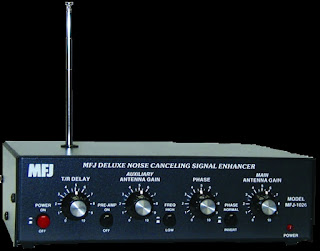 |
| WP2/WQ6X |
While most WQ6X contest BLOG entries detailed a particular contest activity, interspersed throughout the 4 years were topics relating to specific aspects of contesting itself; such as the blog series I did from St. Croix in 2014. [Click HERE]
In addition to operating the RTTY RU contest from St. Croix, as WP2/WQ6X I put over 2000 CW and SSB QSOs in the log using the Yaesu FT-1000mp provided me at the KP2M station; also known as Radio Reef.
 |
| Yaesu FT-1000mp @ KP2M |
Ironically, it was this very radio that used to plague me (back in 2007 & 2008) when I operated November Sweepstakes portable in Ojai Ca.
His super-station was just a mile from me up the hill, with his antennas pointed right down my throat.
For this 100th Blog entry I want to spend time looking at the benefits of contest activity. My non-Contester friends HATE contest weekends because it interferes with their ability to ragchew casually. What my friends fail to realize is that the frequency spectrum the world allows us to play in is a SHARED resource. As radio amateurs, we PRIDE ourselves on our ingenuity - the ability to get the message through, even under the most ADVERSE of conditions.
Sometimes adverse conditions have nothing to do with the frequency spectrum or the ionosphere. Because remotely run station operations are now commonplace, a NEW variable to contend with is internet latency.
 |
| STEPP-IR + 2-el 40 at NX6T |
In RTTY contests (like this one) briefly losing the signal is not a problem because the signals are decoded digitally on the NX6T end and displayed on Station #1's computer screen. While briefly losing internet access to Fallbrook is an annoyance, when the link reconnects, the data is still waiting for the VNC Viewer software on my end to display it.
 |
| RCForb simulation of the Elecraft K3 |
However S&P'ing was a different story. While it is easy to tune CW & SSB signals remotely, tuning RTTY is tricky, and all but impossible with internet dropouts.
Even if you choose NoT to participate in a given contest, there are benefits to just LISTENING to contest activity. If you use a fairly complex radio like my Yaesu FT-1000mp, during a crowded contest you can learn how to best utilize the built-in selectivity features of your equipment. My 1000mp is loaded with optional Collins filters, in addition to its super eDSP.
I also have available the MFJ 1026 interference reducer which attempts to phase-out the QRM at the antenna end of things, before it even gets to the first front-end preamp.
Another useful aspect of contesting is that you can learn to use logging software by just listening (as an SWL) and logging all the stations that you hear. I frequently receive SWL cards (mostly from Europe) after DX contests because many countries in Europe still have a requirement that SWLing experience is a pre-requisite to applying for an amateur license.
In addition to better learning your equipment, logging software contests allows you to become familiar with the various websites that assist us in determining space weather conditions and what areas of the world are open to your QTH.
I learned the SO2V (Single OP 2 VFOs) technique by spending a weekend just listening, SWL-logging all the QSOs I heard.
Because the FT-1000mp uses split-channel audio (one radio in each ear) it is actually possible to work CW stations via the left ear and SSB stations via the right, in mixed-mode contests like State QSO parties (such as CQP).
Listening to contest activity can orient you to superior operating skills. For example, while I never participate in the Thursday nite CWT Ops events, sometimes I will listen in while experimenting with some change to the station layout (like adding in a Radio Shaft 15-band equalizer in the audio line). Just listening and not participating allows me to learn the nuances of my station configuration without any performance pressure.
 |
| WQ6X/6 in 2013 All Asian CW contest |
Whether or not you participate in emergency preparedness activities, anything that points you in the direction of improving your operating skills is a good thing.
Operating contests and submitting a log afterward will allow you to hone your operating skills. Because most major contests now send Log Check Reports (LCRs) for all log submissions, comparing these reports to your actual log allows you to spot errors that you make repeatedly.
After I submit a log, I save the log-submission response e-mail in an e-mail folder for future reference. I also file a copy of the submitted Cabrillo file on my hard drive for future evaluation. Because Cabrillo file are simply text files they take up a tiny amount of space on the hard drive; even logs with several thousand QSOs are actually tiny files by comparison to most things we store on the hard drives.
 |
| San Andreas Faultline Survivors (W6SW) |
Field Day is an excellent way to learn emergency preparedness. Technically, Field Day is NoT a contest, but an operating even; alto many crackerjack operators are out to produce the highest QSO totals they can.
FD brings about operators and friends in large groups.
While many amateurs don't care much about actual operating, they often like being a part of antenna raising and station setup; even being a chef.
Some hams just like to toss down a brewski or three as they wander from station to station checking out the different operations. Many a time I have grabbed them by the shirt and pulled them down to the logging chair or put them in front of the microphone.
CW operators NEVER have to be coerced to sit down at CW station - we LOVE to operate. Several Field Days ago I was in top-form CW-wise making over 900 QSOs behind the key; in addition to my regular late Saturday night SSB operations on75 & 40 meters, where "Geraldine!" often makes the scene. Remember that in Field Day CW QSOs are worth TWO points apiece, as opposed to a SINGLE point for SSB contacts.
 |
| 2016 FD as W6E from a cabin in Twain Harte |
In recent years, thanks to W6KC's IP expertise we have been able to network N1MM+ over a wireless Local Area Network (LAN) by hanging a specially constructed yagi from a tree centrally located between the different stations. An advantage of this is that we can stay informed on what QSOs each station is making; which is good for camaraderie as well as spotting the occasional station failure that occurs.
 |
| non-W7 1st Place |
Do you like to engage in AWARD Hunting? Well guess whut? One of the BEST ways to qualify for major awards is to participate in MAJOR contests. Are you looking to earn WAS (Worked All States)?
The NAQP and WPX contests and of course, the November Sweepstakes can make that happen over the course of just ONE weekend! Are you looking to earn DXCC? During the CQ and ARRL DX contests you can earn DXCC in one weekend.
Are you looking to work all counties in all of the United States? The State QSO parties (such as 7QP in the Northwest and CQP in California) endeavor to activate all their counties over the course of a weekend. Over a years time, by participating in every QSO party you can will find your counties-worked total skyrocket in just a few months.
BOTTOMLINE? We all use a shared resource - the Amateur Radio Bands. You complain about our contest activity? GET OVER IT! I'm just as sick and tired of listening to you at 6am every morning on 75 meters droning on and on about your lousy health conditions. In all honesty, we are NOT INTERESTED in the gory details of your recent gall bladder removal. One of the ways I avoid hams I consider annoying is to spin the tuning knob and/or switch to another band - I have 9 bands to choose from on HF alone.
 |
| NX6T Station #2 |
During one contest I was asked by a Net Control Station (NCS) if I could move frequency + / - 5kc in order that they conduct their daily net activities. I found a new frequency home and picked up where I left off - with happy operators on both frequencies.
Amateur Radio contesting (Radiosport) has many benefits, whether you are a rabid contester (as I am) or not. Give it a try (one contest at a time) and find out for yourself.
The WA7BNM calendar provides a monthly list of most radiosport contests. [CLICK HERE] to check it out.
Contesting can be an exciting challenge. Throughout 2017 look for me during contest weekends operating either as WQ6X, NX6T, N6GEO, or one of the 1x1 callsigns I sometimes reserve; such as W6C, W6K, W6R, K6F or K6M. Like everything else in amateur radio contests, using unique 1x1 callsigns can add to the variety of things and therefore the FUN.
Coming up early this year are the NAQP CW / SSB / RTTY contests, WPX Ssb and JIDX Cw GiGs.
I hope to find YOUR callsign in one of my contest logs.
Here are some QSL cards from previous contest activities.







No comments:
Post a Comment